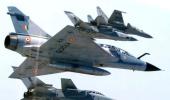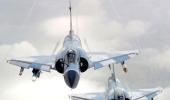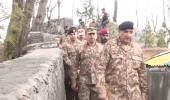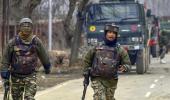'It is purely based on real-time hard intelligence.'
'Timing is important. When you are attacking at 3.30 am, then everybody will be in the academy of terrorists.'
'If you attack at 10 am then someone will be out, so timing is very important.'
'Therefore, 3.30 am is the time when every terrorist is sleeping.'
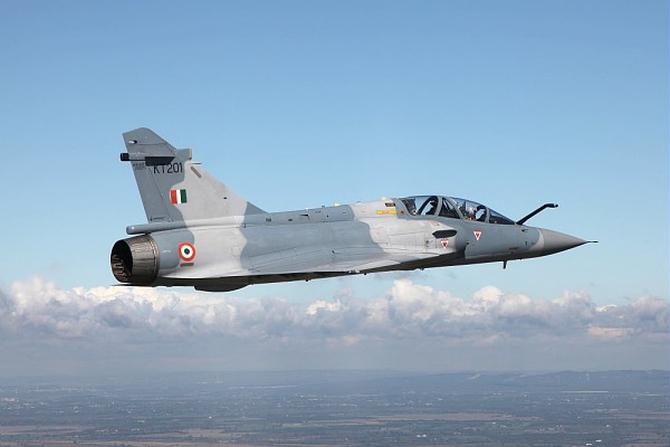
When Indian fighter jets crossed the Line of Control to bomb the Jaish e Mohammed camp at Balakot in Pakistan's Khyber-Pakhtunkhwa province in the wee hours of Tuesday, February 26, 2019, India breached a self-imposed security threshold that kept it from crossing the border even in the face of grave provocation.
This strategic self-restraint made then prime minister Atal Bihari Vajpayee order the Indian Air Force not to cross the LoC during the Kargil war. It was the same principle that held back India's hand in the wake of the 26/11 Mumbai terror attacks.
But on Tuesday, India finally decided that enough was enough. If Pakistan was unwilling to dismantle the terror infrastructure in the country, it would do so. It was a fraught decision, but one in retrospect seemed justified.
"Pakistan will instigate and attempt to carry out more terror attacks in India, maybe activate more sleeper cells," Air Marshal Shyam Bihari Prasad Sinha, who retired as Air Officer Commanding in Chief, Central Air Command, tells Rediff.com's Syed Firdaus Ashraf.
Can we take Tuesday's strike to mean that India has now formulated a new security doctrine, of pre-emptive strikes in the face of a grave security threat?
It is not like that. This entire operation was conducted to eliminate terrorists from the soil of Pakistan.
This is in sync with the United Nations security council resolution where after the dastardly Pulwama attack they declared Jaish e Mohammed an international terrorist organisation. We had the support of all the international community and nations to eliminate these terrorist organisations.
So it is not a change in strategy. We are not taking on Pakistan or the Pakistani establishment. We are taking on terrorists that are operating from Pakistani soil, which Pakistan has declined to eliminate thus far.
Based on intelligence reports, terrorists had panicked and they were moved from the border and Line of Control area.
They were moved back to this Balakot camp where they train all youngsters to become terrorists and fidayeen. Now you had a set-up which had all the commanders of Jaish e Mohammed and Lashkar e Tayiba fidayeen sitting in one place. This was an opportunity to neutralise them.
So it is not a war against Pakistan, but a war against terror, and in the interest of the entire global community.
For India, the attack is a departure from the past when we practised self-restraint even in the face of the gravest provocation. So, why did previous governments not follow a more proactive policy when it came to national security?
Pakistan has realised that it cannot take on India because of the disparity in military power. So it is using terrorism as a State policy to counter India. You know the death by thousand cuts theory.
In the last three decades we have been just talking and urging Pakistan from international forums to do something against terrorism. We wanted to declare Jaish e Mohammed a terrorist organisation, but China did not support us.
It was only in 2016 that the government took a call to strike back, and the Indian Army carried out surgical strikes against terrorist launch pads close to the LoC and the border.
But in this case (the Balakot air strike) nothing could be done because the terrorists had vacated the border. Therefore, an air strike was launched and I think it was a good decision.
We need to commend the political leadership and the prime minister for taking such a bold and decisive step and also the top leadership of the air force and our air warriors.
Is it true that the Indian Air Force was primed to retaliate against Pakistan post the 2008 Mumbai terror attacks? Why was it called off?
It is important to realise that all the three armed forces -- the Indian Army, the navy and air force -- we are always ready 24x7, but anything to do outside Indian borders has to be a political decision.
Once a government takes a decision, we go ahead. When the government does not take a decision, we accept it. We only present what we can do, but it is for the government of the day to decide what needs to be done or not done.
Was a suggestion made after 26/11 to launch an air strike against Pakistan?
We never spoke of attacking Pakistan, but always offered that we will take on terrorist organisations if you provide us hard and real time intelligence wherever they are.
With Pakistan the fear is that any coercive action against it will lead to a nuclear threat. Do you believe Pakistan's bluff has been called after these air strikes?
The nuclear thing is unnecessarily being dragged in. We have not hit any Pakistani military installation or civilian installation. It is not an act against Pakistan.
We have carried out a strike against an organisation that is the fountainhead of terrorism. And in this process we have done what we intended to do.
On the other hand, Pakistan is claiming not much has happened. There was no damage to Pakistani civilians and Pakistani military. In their view, there is not damage to terrorists too, so what are we talking about?
Will Tuesday's air strikes deter terrorists based in Pakistan from attacking India, Indian assets in Kashmir and elsewhere?
It is the intent and projection of national power which includes all aspects -- your diplomatic efforts, military might, public sentiment. Everything put together determines what you should do and what you should not do.
How long can you lie low and keep getting ambushed by Pakistani sent terrorists? There is a limit.
In this case, the nation as a whole had reached its limits of tolerance and acceptance, that is why the government took a positive and decisive action to go ahead and neutralise the terrorists.
If need be, in future the air option is always available and the army is always ready. So depending on intelligence, the government must give a free hand to do whatever the armed forces must want to do.
Is there any reason why the IAF chose the Mirage 2000 for the strike and not, say, the MiG 29 or the Sukhoi 30? What is it about the Mirage 2000 that makes it more suitable for such a cross-border foray?
Which aircraft is chosen is determined by the kind of weapons it can carry.
Before you carry out such a mission there is something called as weapon target matching.
You have to collect the right weapon to destroy the target and then you decide which aircraft can carry this weapon.
And for such a strike, the best capability is the Mirage 2000 and therefore it was chosen.
Such an operation as the Balakot strike must have been weeks in planning. Is our air force always ready for such an operation at short notice? What is the time lag between the nod for operation and actual deployment of the jets?
The air force can launch any mission within a short notice of 3 to 4 hours. But what we need to understand is, when you have a defined enemy or adversary you have adequate intelligence on their military strategic, economic, infrastructure setup, where you can plan your reconnaissance, surveillance and have target folders ready.
When it comes to terrorist organisations they do not have a fixed establishment. So any strike against terrorists has to be based on hard, real-time, intelligence.
If two nations are attacking each other, then things are known. It is available on Google Maps also.
Your power installations, dams, bridges, petroleum installations... everything is available, but how do you hunt terrorists as he must be sitting in some madrasa? The terrorists might be living in the civil population of a city.
Taking on terrorists either through air strikes or ground strikes is extremely difficult because it is purely based on real-time hard intelligence.
Therefore, planning is based on intelligence information.
Timing is important and when you are attacking at 3.30 am, then everybody will be in the academy of terrorists.
If you attack at 10 am then someone will be out, so timing is very important.
Therefore, 3.30 am is the time when every terrorist is sleeping.
It was such a complex operation in which the fear of detection by enemy radar is ever present. How did our Mirage 2000s avoid being detected?
Any mission planning involves tactical routing and you cannot avoid radar detection. You can delay it to an extent, that is feasible.
Everybody does it and there is nothing new about it.
You have to credit the Indian Air Force for the way it has planned and executed this mission.
What special counter-measures did our air force deploy?
Counter-measures come when you get detected because you want to counter the detection.
When you want to delay detection you don't use counter-measures because counter-measures will give away your (position).
Do you see further escalation of cross-border strikes? Is there a danger of it spiralling into something larger?
As far as escalation is concerned, we have carried out the strike against a UN security council declared terrorist organisation as per our right of self-defence, according to the UN resolution.
We have not hit any military or civil targets in Pakistan. It is an act against a terrorist organisation which is a headache to the world.
We claim we have killed 600 terrorists, but Pakistan says we have not done anything. So what will they escalate against?
If they want an eye for an eye, we do not have any terrorist organisations on our side.
Does Pakistan have the capabilities to retaliate against India?
After the defeat of Pakistan in the 1971 War it decided that it is not going to fight the Indian armed forces, but only fight through terrorist organisations.
They will instigate and attempt to carry out more terror attacks in India, maybe activate more sleeper cells.
The entire security establishment and every Indian national should be aware of such possibilities.
If we suspect anything, bring it to the notice of the security establishment.
